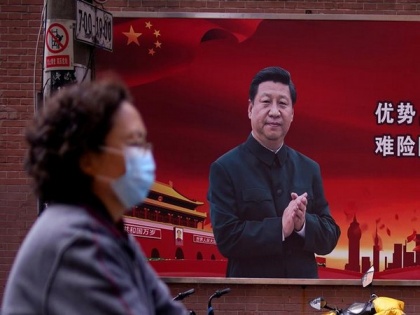China using coronavirus pandemic for pushing it's authoritarianism on fragile democracies
By ANI | Published: April 4, 2020 12:13 PM2020-04-04T12:13:27+5:302020-04-04T12:25:07+5:30
China has been using coronavirus pandemic to position itself as a responsible global leader and to exert its authoritarian methods on leaders wanting to control frustrated public as the lethal infection continues to rage and kill people across continents.

China using coronavirus pandemic for pushing it's authoritarianism on fragile democracies
Beijing [China], April 4 : China has been using coronavirus pandemic to position itself as a responsible global leader and to exert its authoritarian methods on leaders wanting to control frustrated public as the lethal infection continues to rage and kill people across continents.
David Shullman, Senior Advisor to International Republican Institute, wrote in 'War on the Rocks' that Chinese leaders are all to translate their mpulation of the global narrative and provision of medical equipment to countries hit hard by COVID-19 to their concrete benefit.
"Deliveries of ventilators, masks, and virus test kits -- many of which might not work properly -- may come packaged with pressure on countries that have been reluctant to adopt China's terms or integrate Huawei equipment in their 5G infrastructure," Shullman wrote.
Beijing, which is infamous for shutting its critics, is transferring the country's model of information control several fragile democracies.
The regime's crackdown has shut down media outlets and advocacy groups who held the Chinese government accountable for the SARS outbreak in 2003, and which could have sounded the alarm on COVID-19, which has so far killed 54,000 people.
Shullman alleged that China is seeding the same obsession of controlling media in fragile democracies and autocratic nations around the world and is, in turn, is raising the likelihood of future transnational crises.
From Cambodia to Serbia to Uganda, China is offering large-scale training on how to mpulate public opinion, censor and surveil journalists and civil society activists, and implement CCP-style cybersecurity policies.
China's support for authoritarian leaders will exacerbate problems with an information flow that are inherent to non-democratic rule.
Autocratic governments are less likely to receive information critical to stamping out incipient health and other crises because, as occurred in Wuhan during the early days of COVID-19, lower-level officials fear the repercussions of sharing bad news.
Coronavirus, which first emerged in the Chinese city of Wuhan in November, has infected over 1.2 million around the world. Countries like the US has accused China for allowing coronavirus to spread to various other parts of the globe.
The COVID-19 pandemic demonstrated that the dysfunctions of authoritarism in one country can wreak havoc around the world.
The United States and its partners should continue to push back on China's mpulation of the narrative. The United States should prepare for a future certain to be characterized by increasingly frequent Chinese government efforts to dominate the global narrative.
( With inputs from ANI )
Open in app